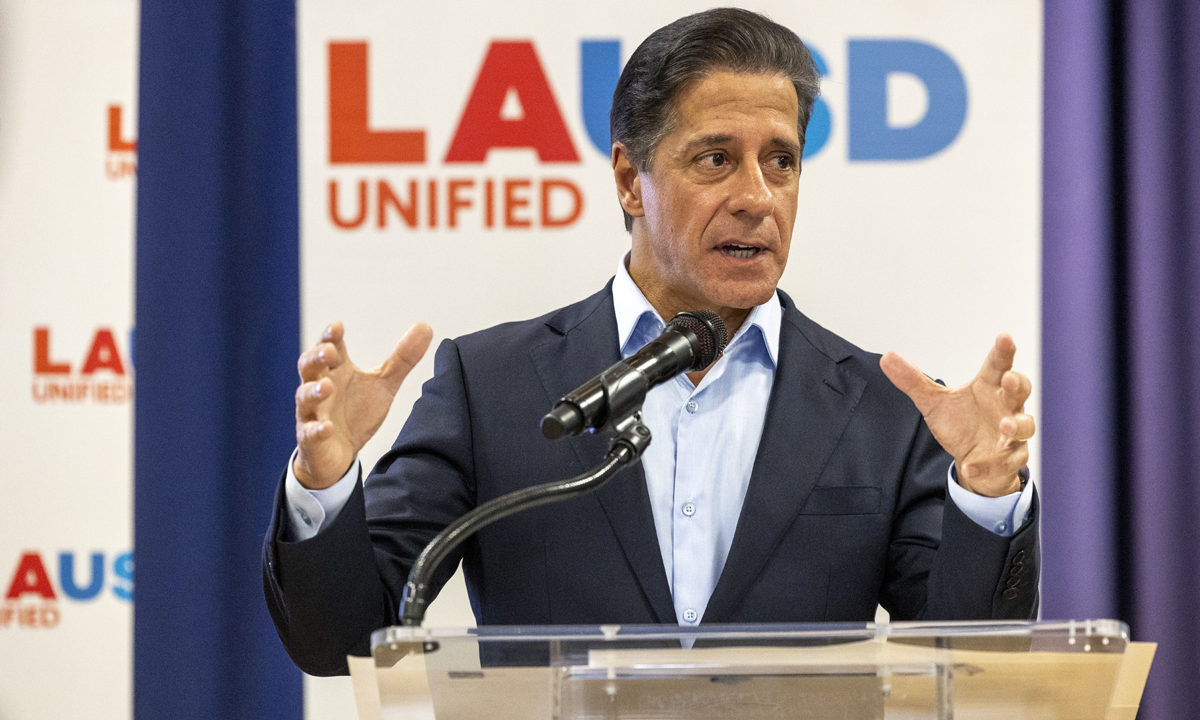New Policy Would Bar Los Angeles Charters from Hundreds of Public School Buildings
Advocates threaten to sue to stop what would be among the nation’s strictest policies limiting charters from sharing facilities with district schools.

Get stories like this delivered straight to your inbox. Sign up for The 74 Newsletter
Charter schools will be barred from hundreds of Los Angeles Unified District school campuses under a new policy that is among the most restrictive of its kind.
The new rules, presented at a school board meeting Tuesday, prevent charters from being sited in campuses that have been identified as serving vulnerable students, accounting for roughly 350 of about 770 school buildings in the district. Charter schools would still be offered space to operate in other LAUSD district school buildings.
The regulations prevent co-locations in low-performing schools, community schools that provide social services, and schools in the district’s Black Student Achievement Plan — immediately impacting about 21 charter schools — now co-located in those buildings — enrolling thousands of students who may need to move to new LA Unified campuses in the fall.
“This is one of those situations that, no matter what, we’re going to have some people dissatisfied on either side,” said L.A. school superintendent Alberto Carvalho, who created the new regulations at the direction of the district school board.
Carvalho said the new regulations are within the bounds of a 2000 state law compelling California districts to provide classroom space for charter schools. There are currently 50 charter schools co-located in 52 LAUSD school campuses, serving roughly 11,000 students. Thirteen additional charters have requested space for the upcoming school year.
“I believe that what has been presented may in many ways alleviate some of the issues,” he added. “However, we need to be vigilant and honest about unintended consequences of well intentioned policies.”
The new rules are a reversal for a city that historically has been friendly to charter schools and was immediately opposed by charter advocates, who threatened legal action in a letter to the school board as soon as the new policy was announced.
California Charter Schools Association president Myrna Castrejón said the rules violate state law compelling the district to give space to charter schools, by keeping them out of entire neighborhoods served by schools in the three categories.
“In the worst case scenario, of course, the schools are literally evicted from campuses,” said Castrejón.
A letter sent to the board by the association said the policy violates a portion of the state law requiring that public school facilities be shared fairly among all public school pupils, including those in charter schools. Castrejón said the policy could create “charter school deserts” in underserved parts of the district.
The long-simmering conflict over charter schools in Los Angeles reached a flashpoint in September when the board issued a resolution compelling Carvalho to create the policy and spelled out many of the specific components it should contain.
The resolution, which was crafted by board president Jackie Goldberg and board member Rocio Rivas, called for the policy preventing charters from being co-located in school buildings that enrolled vulnerable students in the three groups.
“Schools that are struggling the most to educate our students should not be added, continuously, more things to do,” said Goldberg, “like figure out a bell schedule, and how to share the cafeteria and how to share the playground.”
Districts that provide classroom space to charter schools, such as Los Angeles, often decline to offer charters their choice of locations, said Fordham Institute President Mike Petrilli.
But it’s uncommon for a city to delete such a large chunk of schools from eligibility for co-locations, he said. “It’s unusual for the district to be so flagrant, and put it down in writing, rather than to just find myriad ways to make life difficult,” Petrilli said. “It seems very in-your-face.”
The new regulations earned generally positive reactions from board members who backed the changes. The board will vote next month to adopt the policy.
While Rivas and Goldberg spoke in favor of the proposed rules, board member Nick Melvoin, who voted in September against the resolution, spoke against them.
Melvoin said the new policy is unneeded because the district is facing enrollment declines. The rules presented by Carvalho, he said, neglect potential solutions, such as the use of private buildings or more strategic school sitings, to mitigate the negative impacts of co-location.
“We definitely have enough space for everyone,” Melvoin said Tuesday. “We just don’t allocate it properly.”
Get stories like these delivered straight to your inbox. Sign up for The 74 Newsletter

;)